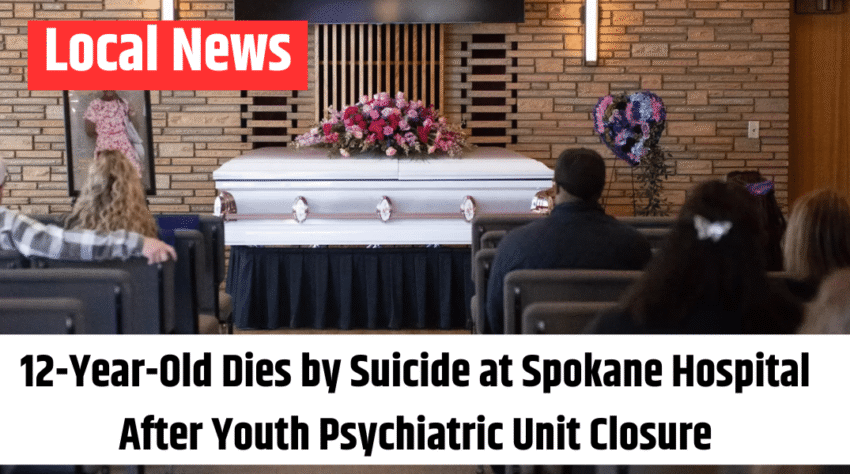This story was originally published by InvestigateWest, a nonprofit newsroom focused on impactful investigative journalism. Sign up for their Watchdog Weekly newsletter to get more stories like this. For inquiries, contact Whitney Bryen at 208-918-2458 or whitney@investigatewest.org, and Kaylee Tornay at 503-877-4108 or kaylee@investigatewest.org.
Editor’s Note: This article discusses suicide. If you or someone you know needs support, call or text the 988 Suicide and Crisis Lifeline, or visit 988lifeline.org for online chat options.
—
A 12-year-old girl named Sarah June Niyimbona tragically died by suicide earlier this month at Spokane’s Providence Sacred Heart Medical Center after she was reportedly left unsupervised while awaiting placement in long-term psychiatric care.
According to family members and three hospital workers involved in her care, Sarah had been in and out of Providence Sacred Heart over the past eight months for self-harm and suicide attempts. On April 13, around 5:30 p.m., she left her hospital room undetected and exited the pediatric floor. She walked about a quarter-mile to the fourth floor of a parking garage on the hospital’s campus and jumped. Despite efforts to save her, Sarah died in the emergency department two hours later.
“We’re heartbroken and confused about how this could happen,” said Asha Joseph, Sarah’s sister. “Why was no one watching her? How was she able to just leave? We have so many questions and no real answers.”
Providence Sacred Heart has not made any public statements detailing what happened. When contacted by InvestigateWest, spokesperson Beth Hegde offered condolences but cited privacy laws as the reason for withholding further information.
The circumstances surrounding Sarah’s death raise concerns, especially because it happened just six months after the hospital closed its dedicated Psychiatric Center for Children and Adolescents. That closure was controversial, with staff, community leaders, and mental health advocates warning it would leave a dangerous gap in services for vulnerable youth. In internal documents earlier this year, hospital officials themselves had acknowledged the center’s critical role despite its financial losses.
After the closure, Sacred Heart executives, including CEO Susan Stacey, reassured the public that a for-profit facility in Spokane could meet the region’s needs. Critics now say Sarah’s death exemplifies the very risks they warned about.
Also Read – Former Senator Joe Manchin Shifts Focus to Energy Industry
“Nurses, doctors, and community members warned that closing the adolescent psychiatric unit would have dire consequences,” said David Keepnews, executive director of the Washington State Nurses Association. “We were concerned that financial priorities were taking precedence over the needs of children.”
Former psychiatric nurse Kaili Timperley echoed the sentiment, saying, “We fought against it. You can’t just place psychiatric patients in regular medical rooms and expect the same outcomes. We knew this wasn’t safe.”
Since the psychiatric center’s closure, children in mental health crises have been housed in Sacred Heart’s emergency department and general pediatric floor. The hospital had converted two pediatric rooms into makeshift psychiatric spaces, but nurses said these rooms lacked the secure design and specialized staffing required to keep suicidal youth safe.
Staff said Sarah spent most of her last three months isolated in Room 350, with limited social interactions and reduced therapeutic support. Unlike the secure psychiatric unit, the pediatric floor lacked locking doors, and staff received no additional training to handle psychiatric emergencies, according to employees.
Initially, Sarah had constant supervision with an in-person sitter and camera monitoring. But in early April, just as Sarah was writing in her journal about wanting to return home, the hospital removed both forms of supervision. Less than two weeks later, she died.
A pediatric nurse involved in Sarah’s care described the feeling of helplessness and frustration among staff, saying, “We tried to raise alarms. We told leadership this wasn’t safe. Removing her sitter put her at serious risk.”
Sarah’s sister Joseph said Sacred Heart has shared little information with the family since her death. “It feels like they’re trying to cover something up or at least hide some details,” Joseph said. “Nothing about it makes sense.”
In the aftermath, hospital employees were instructed not to discuss the incident publicly or on social media. While hospital leadership is conducting an internal investigation, Keepnews emphasized the need for transparency, saying, “Families and the community deserve to know what went wrong, and how Sacred Heart will ensure this never happens again.”
During her final months, Sarah passed the time watching “Friends” reruns and drawing rainbows in her journal. Staff described her environment as bleak and her care as dehumanizing, with safety concerns overriding her access to simple comforts like TV remotes and art supplies.
“She was isolated, and it was heartbreaking,” Joseph said. “Hearing from Sarah that the people who were supposed to help her were actually making things harder was devastating.”
Sarah, the third of six siblings, was known for her bold spirit, love of math and dancing, and her willingness to stand up for classmates at school. After facing bullying both in-person and online, she became increasingly withdrawn. Over time, incidents of self-harm escalated, leading to repeated hospital visits and stays at multiple psychiatric facilities.
Though she had shown signs of improvement recently, Sarah’s long-term psychiatric placement was still pending at the time of her death. Spaces in Washington’s Children’s Long-Term Inpatient Program are scarce, often taking months to secure.
The family is now seeking Sarah’s full medical records and considering legal action as they search for accountability.
At a memorial service on Tuesday, family, classmates, and community members gathered at Riplinger Funeral Home to honor Sarah’s memory. Joseph stood by a white casket with pink trim, sharing stories about her sister’s kindness, bravery, and spirit.
“She was always the first to stand up for someone else,” Joseph said. “That’s just who Sarah was.”
—
InvestigateWest is part of the Mental Health Parity Collaborative, a network of newsrooms reporting on mental health care access and inequities nationwide, with support from The Carter Center.
